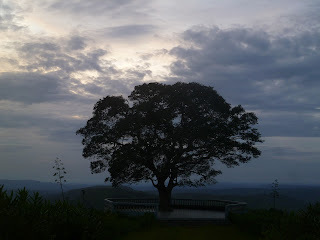My parents came to visit me for a week in my village to experience La Guinée for themselves. Words and pictures can't do it justice. There's no way to capture the smells, sounds and tastes without being here. Most of all, you can't capture the generosity, kindness, sincerity and openness of the Guinean people.
It was fantastic to see my parents, spend time with them and to share my Guinean life with them. They got to meet my host family in Dubreka and my host family in my village. They met my principal, other teachers, my students, my soccer players, the women in the women's group, and endless education and government officials in my village and regional capital.
We didn't start the trip out on the best foot, though. On our way to the Soumba waterfalls, where we had intended to stay the night, a flash-flood river had appeared in the dirt road. I thought maybe it was just a few inches deep and the car could pass, but we saw some villagers who, perhaps also thinking it was only a few inches deep, rolled up their pants and started crossing to find out that in the middle it was more than a meter deep. Welcome to the rainy season. At that point we didn't have enough time to get back to Conakry or go to my village so we went to the only other hotel nearby. I'll just say that between the lack of sheets and pillows, the mice, the bugs and the non-functioning bathroom we didn't get much sleep. Our taxi was late picking us up the next morning, but finally we made it out and were on our way to our village when all of the sudden, POPFPFFGH, one of our tires exploded in the middle of nowhere. Ce n'etait pas grave, there was a spare. However, the wrench could not be found anywhere. Our chauffeur flagged down a passing moto and went to the nearest village to find a wrench. Meanwhile, three fotés were standing alongside the road in the bush. A sight to behold! So much so that many people pulled over to the side of the road to see what our distress was. Some jumped out with their wrenches to see if they were the right size. Finally our chauffeur returned, thank goodness, but only to find that they had brought the wrong wrench. At this point there was quite a crowd and another taxi pulled over and the driver tried his wrench and miraculously it worked. So, 5 marriage proposals, 2 Camara-Sylla insults, many failed wrenches, and an hour and a half later we were back in business.
We arrived at my village in the late afternoon. My whole village knew we were arriving that day and many important people had congregated to welcome my parents but we were so delayed that everyone had gone home by the time we arrived. So the next morning they got together again at our local government office and had a welcome ceremony for my parents. Officials very proudly gave my parents a brief history of my village and the demography and geography, translated by our high school English teacher. Afterward two of my 12th grade students presented my parents gifts of handmade clothing from Guinean fabric. Afterwards they got a tour of the elementary, middle and high schools and a bit around my village.
Reunion at the airport
My parents enjoyed their first evening on the beach hanging out with other volunteers
We stopped in Dubreka to visit my host family from training
Across the generations and borders


Mama Africa meets Mama America. Elhadj meets my Dad
Part of my Dubreka family
We stopped at the training center to meet my host Dad who was working
And we also got to say hi to some of the new trainees :)
Welcome Ceremony
Guinean-Americans
The welcome reception
Important people
On a tour of the locals schools
Village host family
My neighbor, Issiaga
A trip to the tailor
We got some very fashionable clothes
Some of the important women in my life: my village host mom, my mom, and the president of the women's group
My host sister Bobo demonstrating how to make a fire in our kitchen
Host brothers and sisters outside the kitchen
After their trip to my village we went to Morocco and I spent 2 weeks of vacation there. More on that in a future post. Until then, Ooo-Ooo






























































